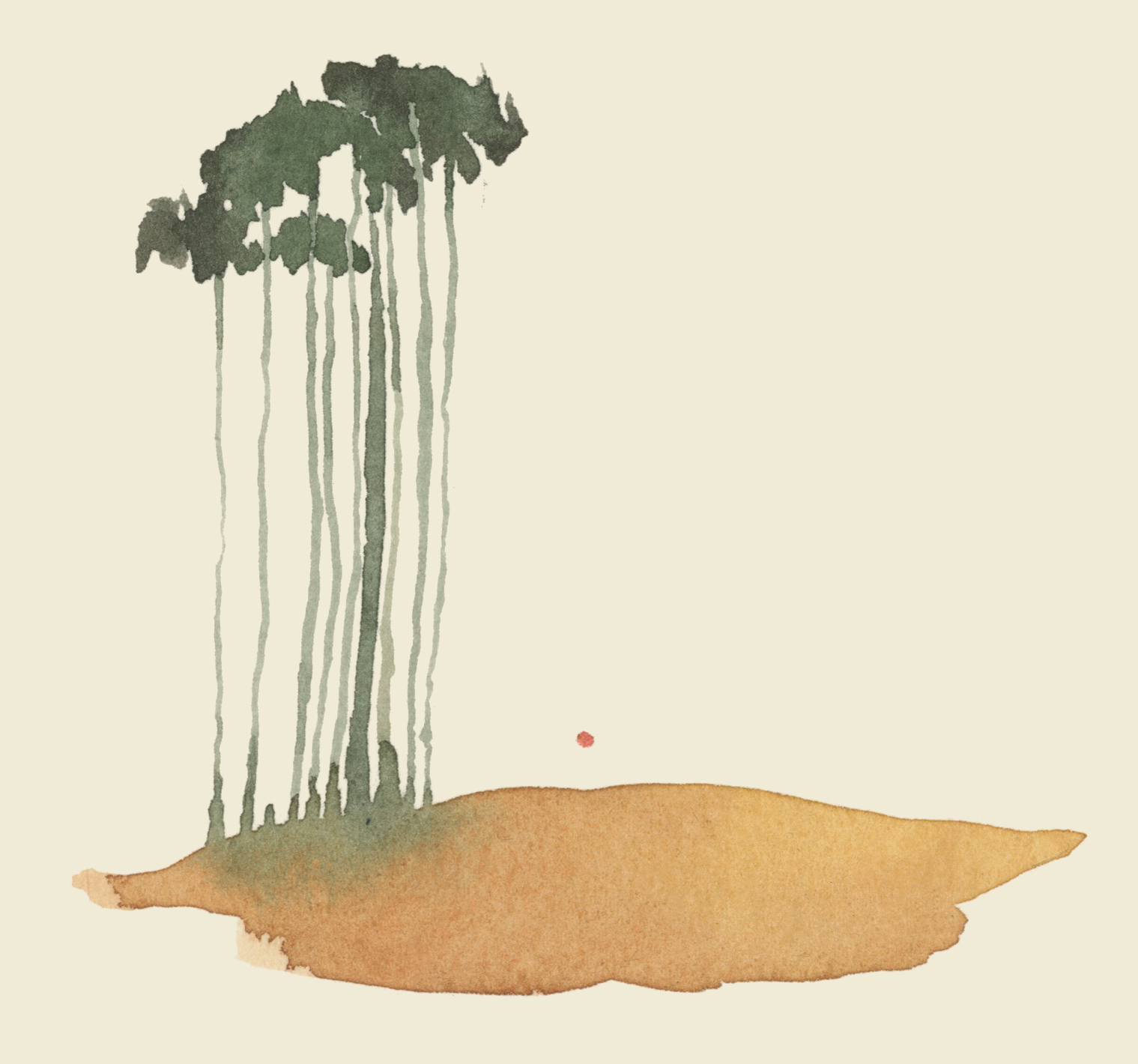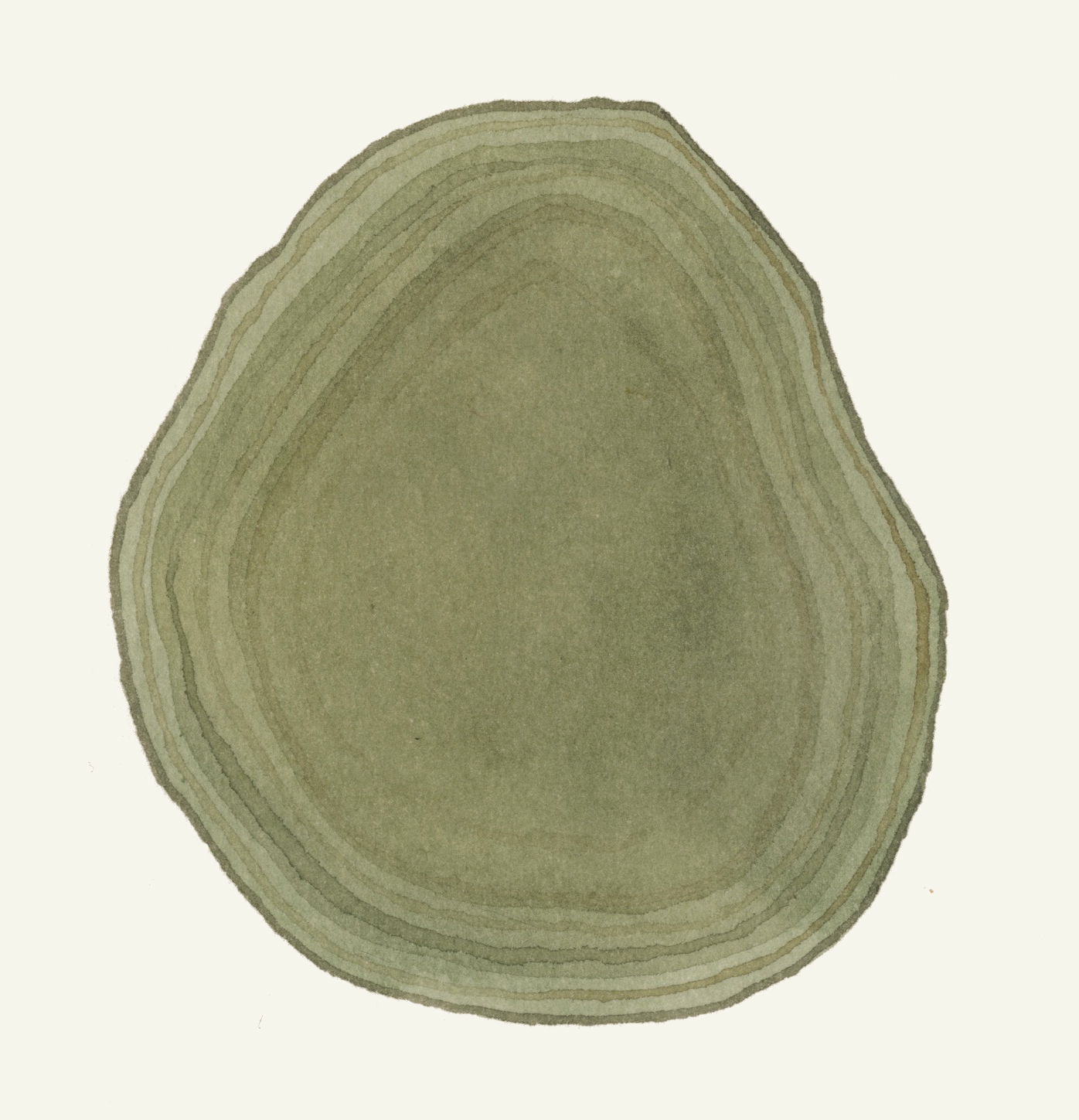Jephtha and His Stump
Dayi Fu
Brittle and fading lived a man named Jephtha in a large mudstone house. He owned nothing valuable besides one cow, a gift from his son, which provided him milk and cheese. The town he lived in used to welcome many visitors and bore a resemblance to splendid ancient trading cities, but soon diminished in greenery, new faces, and any sense of celebration at all. Jephtha himself was at one point quite wealthy, for you see he was known throughout the region to be a skilled physician, and fathered two children at the height of his success. Now, Jephtha found himself alone and surrounded by people with no memory of him.
When he was younger, Jephtha would find herbs and roots for medicinal practice in a forest which grew by his house. Though his bones had grown old and his mind fragile, the forest still ascended miraculously. Jephtha would walk among the trees of this great forest, despite his creaking knees and cracking feet, because this helped him remember all of his accomplishments and good deeds. While strolling, he could sweetly recall the times he had cured and helped and loved during his earlier years. The spread of verdant growth and the darting little creatures reminded him of the people whose lives were better because of him. Eventually, night's blackness would descend, and Old Jeptha would return to his house. There, he would be plagued by all the memories of his bad deeds. No matter how clean his house or how comfortable his bed was, Jephtha could not help but relive the times he had lied, betrayed, desecrated. He would become saddened by the thought of bringing such enormous grief into the world. Regret would be lay so heavily that he would struggle to fall asleep. Therefore every morning, Jephtha would bring himself into the great forest by his house again to desert these ugly memories and recollect beautiful ones. That is, of course, until the darkness would pull him back into his dark bed and his dark retrospection.

One day, while treading in his usual way, lost in his thoughts, Jephtha came upon a somewhat peculiar looking tree stump he had never noticed before. "From its shape and color, I can see that it is the remnant of an Uriah tree," he deduced. Then, "I see that this stump's size and breadth marks it as a once extremely fruitful tree, indeed." And subsequently, "Yes! Its glazed skin and delicate rings declare its glorious and long and most definitely extraordinary reign in this great forest. I see how its smoothness and graceful curves betray its magnificence, and... oh, Uriah stump, I hear your proclamation with consummate ears! With your grasping roots, you profess your still-robust spirit and large appetite. Be unseen no longer! I will visit and appreciate you as you so deserve!" With that, Old Jephtha returned to his house.
Jephtha began visiting this stump every day and soon forgot his past. Though it would never reply, for it was a tree stump and quite dead, the old man's affection grew powerful, and his mind rarely strayed from the image of his divine stump. After all, the stump was his friend, and he had no other. Jephtha found such enjoyment in its company that his usual nightly torment ceased, and he was never denied peaceful slumber. Then one evening, deep in his reveries, Jephtha suddenly lept erect from his bed and hurried out of his house, into the forest. He was suddenly filled with conviction to confess his feelings of friendship and gratitude to the stump, who had lifted him out of his nightly routine of suffering. The Moon in her lustrous mercy lit Jephtha's way through the forest, but he did not arrive at his beloved without taking a few wrong turns. When Jephtha finally came upon the stump's effervescent form, he sighed at its magnificence.
Jephtha cleared his dry throat and commenced his speech. It was a long speech, beginning with "Behold! Your wondrous love and beautiful shape" and ending with "Woe to those who deserted you," and he thought it effectively communicated his passion. Face aflame, Jephtha was pleased. Then, to his astonishment, Jephtha witnessed the most fantastic event that he had ever seen. In a sudden blaze of light, the Uriah stump began to grow upwards. The bark crackled as it writhed in its reborn branches and spoke:
Good Jephtha, your grand speech is acknowledged, and you have my attention. May you be blessed by the divine member that you have comforted long, as I raise for you three people from the dead.
The old man heard this, and with glee he returned home. Jephtha spent the night in his house pondering the exceptional opportunity to return someone from his past to life. He considered raising his closest companion, the earnest clergyman, and he considered his late mentor, the apothecary. He remembered his noble father, and of course, he thought of his bright and kind son. While reexamining his past, memories of his misdeeds returned, and Jephtha once again agonized over his sins. He concluded that yes, he would use this chance to make peace with three people he had wronged. This would banish regret from his mind forevermore.
He found the stump the next day and gave his first choice, his mother, who never lived long enough to see his life become such loneliness and despair. The stump listened, and a vaporous form soon arose from the forest ground. Jephtha began to weep. He threw himself into the fog, his mother, and cried out, "Mother! I weep in remembrance of your gentle kindness. You were alone in your later years and alone on your deathbed, and for that I am utterly shattered with remorse. But now, you would be even more so distraught and afflicted," he cried, "to know how alone and tormented I am by the sins of my own hand. Imagining you in such distress over me... drives me mad every night. I myself know this pain, for I know my children's pain." Jephtha pleaded the fog, his mother, to resolve him of this. She replied with a pleasant breeze, "My son, I forgive you," and dissipated between the trees. Jephtha witnessed this. The thought of his mother no longer brought him sadness, and he was very pleased. The old man returned to his house, enjoyed himself in his bed, and fell happily asleep.
On the next day, Jephtha gave his second choice, and the Uriah stump brought back Old Jephtha's wife in the form of a woods rabbit. To the rabbit, his wife, he bellowed his regret for being a rotten husband; he was unattentive, mean, and unfaithful and so wished for forgiveness. "I was only thinking of my own well-being when you found me in my immoralities. You were right to cast me aside. But now I see my deeds as corrupt and hideous! As I have lifted you from the blackness of death, lift me into peace!" The rabbit, his wife, shed a tear and gently bounced into his lap. Jephtha stroked his wife's soft fur and held the fragile hands that raised his children. Jephtha again felt the gravity of his transgressions lighten, and he released his wife. Jephtha watched her exit his view, and he was pleased. He returned home, enjoyed his hands, and found easy sleep.
Old Jephtha had no trouble choosing his third and last person, for he knew who had to bear the worst of his evil staff—his daughter. He felt such shame in remembering her softness that the thought of having to face her again was suddenly frightening and a bit preposterous. Still, Jephtha had his conviction. At the stump, he gave her name. "Though I am afraid, bring me my soiled daughter." The great forest swayed. The Uriah stump trumpeted and said, Alas, she will not come forth, for she has not yet found Death. Jephtha heard this and was surprised that his daughter was still alive. He was equally disappointed that he had lost a moment of relief. He returned home, brooding his mistakes and did not sleep well.
Morning rose, and while Jephtha was churning his milk, the front door opened and there stood a woman. The woman was along in years and was merely passing through the dusty town to reach the next. She wore fine shoes and clean garments. Out of curiosity, she had wanted to visit her childhood home, and though the house was as she suspected, seeing her father alive was a surprise, so she said. Jephtha was tremendously delighted to see this old woman, his daughter. Though he was bewildered by her image, the old man immediately began his third spiel. He brayed and moaned and blustered about his revelations and self reflections—and how these new understandings must have drawn her to his door. Finally, Old Jephtha asked the old woman, his daughter, for the gift of forgiveness.
The woman revealed that Jephtha, her father, had undeniably caused her grief and anxiety while she lived in his house. After leaving years ago, she found it difficult to peacefully settle into a new life: everything reminded her of her childhood. Her own house provided no escape. Eventually, by her own will and strength, she was able to forget, marry, carry out a happy profession, support the town in its various endeavors, and even raise sturdy children. On this day, she was able to look upon the old miserable fortress with clear, unmoved eyes and retain calmness in her mind. However, because of Jephtha's words, everything dark and evil that she was able to imprison in the far recesses of her mind burst forth, and she recognized each ugly memory. With her mind thrust backwards and her face enveloped in a brilliant light, she raised her staff and dashed the old man to one hundred thousand pieces.
The neighbors were watching the entire time and let the woman pass through the town. A wind blew through the sandy establishment Old Jephtha called home, and his body and bones withered to ashes. The ashes were gathered into the desert wind and scattered throughout the region. Some of it landed in a bowl of soup, which his son, who was still alive, ate. Some settled over the great forest. But most of the ashes, Jephtha's body, was everywhere and underneath everything, never to be put together ever again.

Dark Mode!